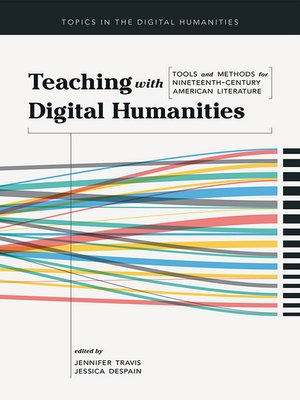Teaching with Digital Humanities
ebook ∣ Tools and Methods for Nineteenth-Century American Literature · Topics in the Digital Humanities
By Jennifer Travis

Sign up to save your library
With an OverDrive account, you can save your favorite libraries for at-a-glance information about availability. Find out more about OverDrive accounts.
Find this title in Libby, the library reading app by OverDrive.



Search for a digital library with this title
Title found at these libraries:
| Library Name | Distance |
|---|---|
| Loading... |
Travis and DeSpain curate conversations on the value of project-based, collaborative learning; examples of real-world assignments where students combine close, collaborative, and computational reading; how digital humanities aids in the consideration of marginal texts; the ways in which an ethics of care can help students organize artifacts; and how an activist approach affects debates central to the study of difference in the nineteenth century.
A supplemental companion website with substantial appendixes of syllabi and assignments is now available for readers of Teaching with Digital Humanities.
| Cover Title Page Copyright Contents Acknowledgments Introduction: Digital Humanities and the Nineteenth-Century American Literature Classroom Additional Tags PART ONE. MAKE 1. Kaleidoscopic Pedagogy in the Classroom Laboratory 2. The Trials and Errors of Building Prudence Person's Scrapbook: An Annotated Digital Editio 3. Nineteenth-Century Literary History in a Web 2.0 World PART TWO. READ 4. Melville by Design 5. Data Approaches to Emily Dickinson and Eliza R. Snow 6. Reading Macro and Micro Trends in Nineteenth-Century Theater History PART THREE. RECOVER 7. What We've Learned (about Recovery) through the Just Teach One Project 8. The Just Teach One: Early African American Print Project 9. Teaching the Politics and Practice of Textual Recovery with DIY Critical Editions PART FOUR. ARCHIVE 10. Putting Students "In Whitman's Hand" 11. Making Digital Humanities Tools More Culturally Specific and More Culturally Sensitive 12. Teaching Bioregionalism in a Digital Age PART FIVE. ACT 13. DH and the American Literature Canon in Pedagogical Practice 14. Uncle Tom's Cabin and Archives of Injustice 15. Merging Print and Digital Literacies in the African American Literature Classroom About the Contributors Index |"Accessible, timely, and practical." —Legacy"Relevant not only to practitioners and theorists of digital humanities but also to students and scholars of 19th-century American literature. . . . Highly recommended." —Choice
"In this compelling collection of essays, Travis and DeSpain explore the many ways in which digital humanities scholarship is remaking the pedagogy of nineteenth-century American literature. Teaching with Digital Humanities highlights the virtues of estrangement—how we can better see books, manuscripts, and newspapers once they've been tagged, aggregated, or otherwise reconfigured. Both the material forms of texts and the contents they convey are ripe for fresh analysis in a digital environment. This book is an invaluable guide to teaching within a new horizon of possibility introduced by digital methods."—Kenneth M. Price, coeditor of The Walt Whitman Archive
|Jennifer Travis is a professor and chair of English at St. John's University. Her most recent book is Danger and Vulnerability in Nineteenth-Century American Literature. Jessica DeSpain is an associate professor of English language and literature, editor of The Wide, Wide World Digital Edition, and codirector of the Interdisciplinary Research and Informatics Scholarship Center at Southern...







